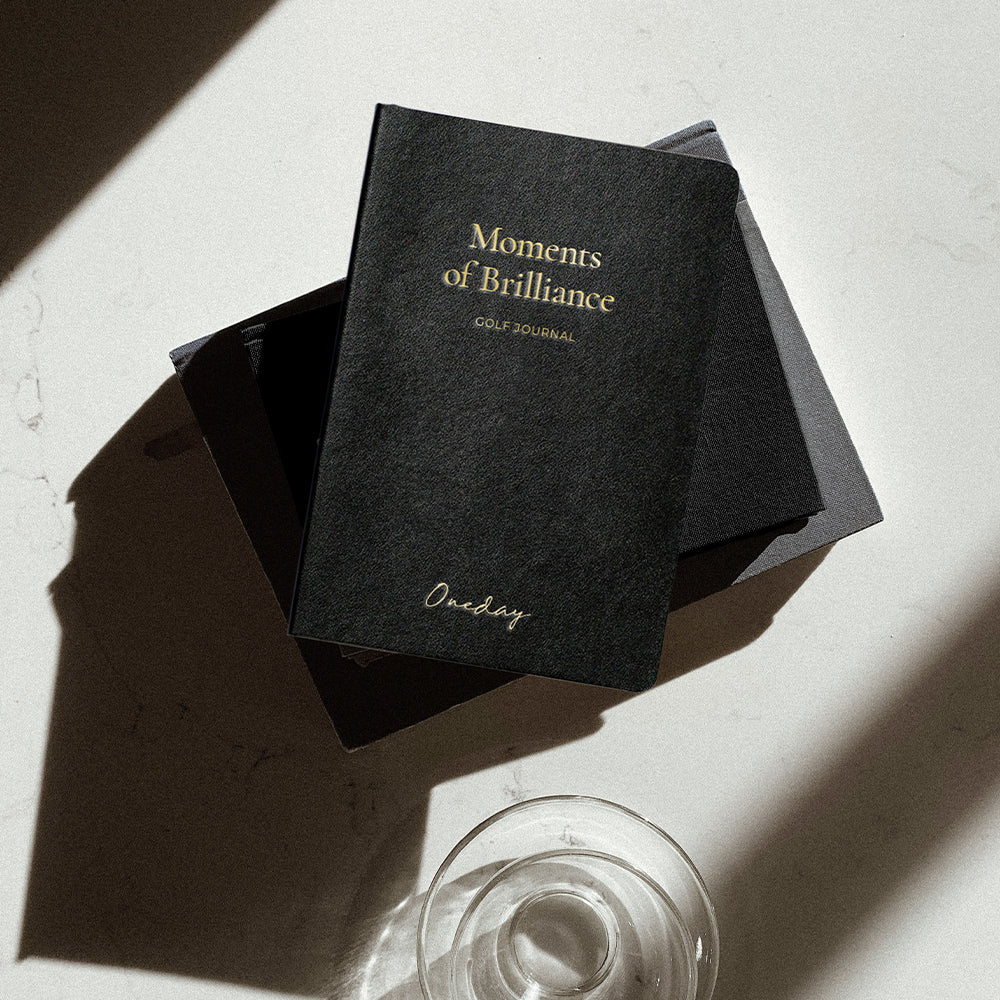
10 Incredible Benefits Of Golf Journaling
Journaling is making a big comeback. In an age where vast knowledge is available at our fingertips, it’s easy to forget how much wisdom can come from our own selves. In a world where millions share their daily lives and its most insignificant details on social media, it’s refreshing to take back some personal expression and reclaim it for ourselves.

According to many golf coaches, journaling is one of the most potent and powerful habits a golfer can acquire to improve their handicap. Your new ‘Moments of Brilliance’ Golf Journal is a destination of discovery for all golfers – a place to be inspired, find connection with your inner self and explore all aspects of your game, remembering and recording their moments of brilliance and the wonderful times spent playing golf with family, friends and colleagues.
Your Golf Journal is all set out for you ready to go. It educates, motivates and guides you through 18 rounds of golf allowing you to rate your progress and write about your experiences. Easy to reorder when you’re done, you’ll be able to keep your journals to
Look back on and monitor your progress and enjoyment!
Here are 10 incredible benefits of golf journaling and the reasons they will work for you.
1. Journaling Improves Your Mental Game
“The whole secret to mastering the game of golf is to cultivate a mental approach to the game that will enable you to shrug off the bad days, keep patient and know in your heart that sooner or later you will be back on top.” -ARNOLD PALMER
The techniques we suggest are incredibly powerful but simple tools thousands of golfers are using to improve their mental game of golf. We’ve created this Golf Journal for you to record your best shots, let’s call them your ‘moments of brilliance’. It is based in science and positive psychology using golfing techniques that are used by top professional golfers and coaches. You’ll find many of their quotes and coaching tips featured in this journal.
After every round (or when you get home or back to the office after golf) write down the three best shots you hit. Even in your worst round you will hit three good shots. Really commit to this and think vividly about those shots, mentally transport yourself there and play them over in your head like a highlight reel as you write.
2. Journaling Reduces Stress And Anxiety
“The more tranquil a man becomes, the greater is his success, his influence, his power for good. Calmness of mind is one of the beautiful jewels of wisdom.” -JAMES ALLEN
Golf Journaling lets you work through your anxious feelings and obsessive worries. When you ask yourself how likely the worst-case scenario is, you gain a more realistic perspective on life and your golf.
Getting your thoughts down on paper helps you identify stress-inducing thoughts and beliefs that are distortions of reality. You begin to notice when you’re in a bad mood or when you overgeneralize with words like “always” or “never” to describe your experiences. Journaling about your anxieties soothes your nerves and helps you brainstorm for solutions to your problems. Write about a moment or two of brilliance and you’re sure to be less stressed!
3. Journaling Improves Your Mindfulness
“Be happy in the moment, that’s enough. Each moment is all we need, not more.” -MOTHER THERESA
Mindfulness, or being in the present moment and aware of your surroundings, can be boosted through journaling. Writing about your surroundings and the present moment helps you become more mindful every day – even when you’re not journaling. It teaches you to pay attention and be present.
Being in the present moment lets you escape that endless cycle of brooding over the past or worrying about the future. You’re left in the now to take things in with all your senses. Mindfulness lets you appreciate life without letting it pass you by.
4. Journaling Improves Your Self-Confidence
“We ask ourselves, ‘Who am I to be brilliant, gorgeous, talented, fabulous?’ Actually, who are you not to be?” -MARIANNE WILLIAMSON
Journaling about a positive experiences and moments of brilliance allows your brain to relive them. And reaffirms your abilities when the ugly head of self-doubt appears. The release of endorphins and dopamine will boost your self-esteem and mood. These reflections can become a catalogue of personal achievements that you continue to look back on.
Journaling removes self-doubt. Noting down your game’s achievements makes you revisit the experience and reaffirms what you are capable of. It removes self-doubt and elevates your mood and confidence. These reflections can accumulate into a catalogue of personal accomplishments to which you return to time and again. You have a documented record of your past accomplishments and your moments of brilliance.
5. Journaling Boosts Your Immune System
“Journaling can help people sleep better, feel and think better, and have richer social lives, all of which can bolster immune function and improve health.” -JAMES PENNEBAKER.
Now more than ever, people are realising the importance of a healthy immune system. Research into the science behind journaling has proved that even your immune system can benefit from journaling! That’s because when you have a clearer state of mind and fewer distracting or stressful thoughts dragging you down, your physical health benefits too.
Though venting into a journal isn’t enough, research suggests people who use writing to better understand their emotions get the most benefit. Writing gives structure to your anxious feelings and helps you get past them. Psychologist James Pennebaker says that journaling strengthens immune cells called T-lymphocytes. He believes that journaling about stressful events also helps you come to terms with them. And this reduces the impact of stressors on your physical health.
6. Journaling Improves Your Sense Of Gratitude
“You cannot do a kindness too soon because you never know how soon it will be too late.” -RALPH WALDO EMERSON
Writing down your game thoughts and moments of brilliance can boost your sense of gratitude.
Keeping a golf journal can have life-changing effects. Writing in a journal can lower blood pressure, improve immune function and help you sleep better, a study found. Writing about your great golf moments also helps with fatigue and insomnia. Positive Psychology says that writing in your journal makes you less stressed and more grateful. It also helps with preventing burnout and encourages patience.
7. Journaling Improves Your Communication Skills
“Communication is a skill that you can learn. It’s like riding a bicycle or typing. If you’re willing to work at it, you can rapidly improve the quality of every part of your life.” -BRIAN TRACY
Putting your thoughts to paper forces you to articulate your ideas and, in turn, find words that express those ideas accurately and concisely. The more you journal or write, the better you get at it and the more your communication skills improve.
Journaling is a wonderful tool because it allows you to explore and clarify your thoughts. Writing has critical connections to speaking, according to a Stanford Communication report. Journaling is a form of written communication, albeit to oneself. Nonetheless, the sub-vocalisation of tracing your written thoughts naturally translates in actual vocalisation.
8. Journaling Leaves A Record For Your Future Self
“Learn from yesterday, live for today, hope for tomorrow. The important thing is not to stop questioning.” -ALBERT EINSTEIN
A good journal is like wine – it gets better as it gets older. After a few years go by, old journals are gold for your future self to look through. It documents how you’re enjoy your golf and how you’re improving.
Reading through old journals can give you perspective on how far you’ve come – and what roads you’ve still to travel. It also makes you grateful for everything you’ve had. You can look back and experience your joyful moments once again.
Your journals are also a wonderful resource for inspiration to keep working on your golf game.
9. Journaling Improves Your Memory
“Then the Warrior of the Light thanks his travelling companions, takes a deep breath and continues on, laden with memories of an unforgettable journey.” -PAULO COELHO
Reflecting on things that happened in your game is one way that the brain makes sense of those events. Recording thoughts and feelings helps cement them into the brain. Over time, the act of sitting and journaling on a regular basis after your game can help with memory retention. Like the other benefits from journaling, journaling for memory improvement is most effective when done on a regular basis.
If you are searching for transferrable journaling benefits, it is essential to know that journaling can improve your memory. When you write things by hand, your brain processes it better and commits it to memory. Also, journaling forces you to focus on a particular idea or thought. Because of the nature of memory and the brain, you are more likely to remember the things you focus on. So if there are elements of your game that need working on, you’ll be able to easily identify them.
The act of writing something down makes you more likely to remember it. Recent neuroscience research has uncovered a distinct neural pathway that is only activated when we physically draw out letters. And this pathway, which gets paved deeper with practice, is linked to our overall success in learning and memory.
10. Journaling Improves Your Practice Performance
“You see, in life, lots of people know what to do, but few people actually do what they know. Knowing is not enough! You must take action.” -TONY ROBBINS.
A study done by the Harvard Business School into the science of journaling found that journaling’s benefits include improving an individual’s performance, making them 25% more productive. This particularly applies to your practice sessions.
How does this work? Well, the researchers suggested that the productivity benefits of journaling come from the chance to reflect on past experiences. When we take a moment to notice what we’ve learned from these experiences, we can start to incorporate that new wisdom into the future. You realise the benefits of practice and how it affects your golf handicap.
Next steps
Like to try golf journaling for yourself? Ready to take your golf game to the next level? Explore our Oneday Golf Journals HERE.



